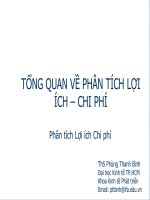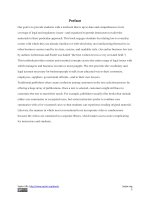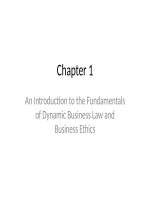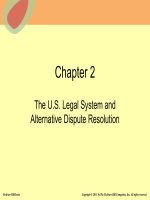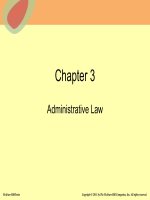7 1 apec egeec introduction to the value of iso 50001 standards and guidance
Bạn đang xem bản rút gọn của tài liệu. Xem và tải ngay bản đầy đủ của tài liệu tại đây (4.46 MB, 55 trang )
The Value of ISO 50001 for Advancing
APEC Energy Efficiency Goals
September 11, 2016
Li Pencheng
APEC EGEE&C Workshop on ISO 50001
Tarapoto, Peru
ENERGY MANAGEMENT SYSTEMS (ENMS) – A
KEY TOOL FOR MEETING NATIONAL GOALS
Despite Significant Benefits…Lots of
Untapped Potential
Source: World Energy Outlook, IEA 2012
Supportive policies are needed to remove barriers and facilitate market adoption
Current practice: Project-Based approach to energy
efficiency
Project - based approach focuses more
on investments in new, more efficient
technologies.
Technological
Change
The result is that over time energy
performance fluctuates and
efficiency potential goes unrealized!
Key challenges with this approach:
• Investments in projects are
cyclical
• Energy saving of projects are
often not sustained
Energy & Cost Savings
(over time)
What is Missing in the Project-Based
Approach to Energy Efficiency?
Project-Based Focus on
Technological Change
But
what
about…
Holistic strategies?
People?
Raw Materials and
Energy Sources?
Controls?
A more Comprehensive approach to Energy
Efficiency is needed
Organizations that target behavioral and organizational barriers, as well
as technological, can achieve continual improvement in energy
performance.
Technological
Change
Continuous improvement!
Comprehensive
Energy
Management
Behavioral
Change
Organizational
Change
Energy & Cost Savings
Staff at every level of an organization need
to be engaged and involved in order to
achieve energy goals!
(over time)
ISO 50001 Delivers Significant Impacts
ISO 50001 Global Savings Potential to 2030
~62 exajoules of cumulative energy savings
International
$600 billion in energy costs
Standard
6,500 Mt of CO2 emissions avoided
Almost 9
gigawatt-hours
of energy saved
in 2014
$900,000
savings in first
year with 4
month payback
Improved
energy
performance by
15.2% 2 years
ISO 50001 International Standard - a strong Policy
Tool for meeting Energy and Climate goals
•
Business-friendly practices and requirements
•
Applicable to any organization that uses energy
•
Goes beyond projects, and promotes institutional change
within organizations to ensure energy efficiency is
integrated into day-to-day operations.
•
Over 50 countries currently involved in standard-making
process – many countries adopting ISO 50001 as national
standard
•
Thus, it is the global best practice standard for energy
management that can help measure real progress toward
energy efficiency goals at national and international levels.
•
Achieving certification requires organizations to set energy
performance goals and to meet those goals within a
regulatory or voluntary policy environment.
14,000+ certified
sites worldwide
as of Sept. 2014
Turning Best Practice Standards into Robust and consistent
Implementation
Global Standard
Development
International
Engagement
Local Implementation
• ISO 50001 Standard Technical Committee plays
an important role in defining international best
practice standards and guidance.
• Development of robust policies, programs, and
resources for national and international use
• Sharing of best practices to ensure robust and
consistent implementation of the standard
• Government, international organizations, utilities,
energy service companies and others work on
the ground to help organizations implement best
practice standards
BACKGROUND ON THE ISO 50001
FAMILY OF STANDARDS AND GUIDANCE
Unique role of Governments
Governments are best suited to fulfill certain needs to promote ISO 50001.
Actions that facilitate successful ISO 50001 outcomes in industry:
• Develop supportive policies and programs to address barriers to implementation
–
–
–
–
•
Technical resources and tools
Pilot projects and demonstrations
Workforce development programs
Coordination among national bodies to build quality infrastructure for programs
Work with national accreditation, certification, and training bodies to ensure that
quality infrastructure meets national energy and climate goals.
• Provide recognition to businesses that adopt ISO 50001 and contribute to
national energy and climate goals.
• Leverage IPEEC and EMWG participation to ensure that domestic programs
promote and are consistent with international best practices on ISO 50001
implementation.
ISO 50001 Standard
Development
Technical Committee - TC 301
Implementation
Guidance
ISO 50004
Guidance for the
Implementation of
an EnMS
Participating countries: 50
Observing countries: 24 (and international
organizations such as UNIDO and others)
JWG 3
WG 2 – Energy
WG 1 – ENMS
50001
TC 301
(China and U.S.,
Co-leads)
Performance
Metrics
EnMS Auditing
Energy
Performance
Indicators
Baselines
ISO 50003
ISO 50006
Requirements for
audit and
certification of an
EnMS
Measuring Energy
Performance using
Energy Baselines and
EnPI
These standards are a strong foundation for programs and
resources to be developed for industry to implement
energy management and ISO 50001.
WG 4
(with TC 257)
Measurement &
Verification
Opportunities for
Improvement
Measurement and
Verification
Energy Auditing
ISO 50015
Measurement and
Verification
ISO 50002
Energy Audits
Plus more standards planned through these WGs:
WG 5
Energy Services
WG 6
Data for EnMS
ISO 50001 Family
ISO 50001
Energy management systems – Requirements with guidance for use
Energy Planning
ISO 50004
EnMS – Guidance for
the implementation,
maintenance and
improvement of an
EnMS
Use for energy
review
ISO 50002
Energy Audit
ISO 50006
Implementation
and operation
Checking
Providing the methods
for monitoring,
measurement, and
verification of energy
performance
Measuring Energy
Performance
ISO 50015
M&V Guidance and Principles
for Organizations
ISO 50003
Improvement
Bodies providing audit and
certification of EnMS
Internal Audit
EnMS certification process
Graphical representation based on presentation by Alvaro B A Pinto, Eletrobras, EEMODS, 2013.
Certification
ISO/IEC 17021
Conformity assessment –
requirements for bodies
providing audit and
certification of management
systems
Measurement and Verification of Energy
Performance
ISO 50015
M&V Guidance and Principles
for Organizations
ISO 50003
Bodies providing audit and
certification of EnMS
• Provides a set of principles and guidelines for
Measurement and Verification, thereby increasing the
credibility of energy performance.
• Specifies requirements for competence, consistency and
impartiality in the auditing and certification of energy
management systems (EnMS) for bodies providing these
services.
• In order to ensure the effectiveness of EnMS auditing, it
addresses the auditing process, competence requirements
for personnel involved in the certification process for
energy management systems, the duration of audits and
multi-site sampling.
• Intended to be used in conjunction with ISO/IEC 17021.
Energy Baselines and Energy Performance
Indicators
ISO 50006
Measuring Energy
Performance
ISO 50004
EnMS – Guidance for the
implementation,
maintenance and
improvement of an EnMS
ISO 50002
Energy Audit
• Provides guidance to organizations on how to establish,
use and maintain energy performance indicators (EnPIs)
and energy baselines (EnBs) as part of the process of
measuring energy performance.
• Provides practical guidance and examples for establishing,
implementing, maintaining and improving an energy
management system (EnMS) in accordance with the
systematic approach of ISO 50001.
• Specifies the principles of carrying out energy audits,
requirements for the common processes during energy
audits, and deliverables for energy audits.
For energy audits and
energy calculation of baseline
Optional:
TC 257: Energy Savings Determination and Evaluation
• ISO/DIS 17741: General technical rules for measurement, calculation and verification
of energy savings of projects
• ISO 17742: General calculation methods on energy efficiency and savings for
countries, regions or cities
• ISO/DIS 17743.2: Definition of a methodological framework applicable to calculation
and reporting on energy savings,
• ISO/CD 17747 (joint working group with the TC 242 (JWG4): Determination of energy
savings in organizations
The topics in the above standards are covered in ISO 50006 and ISO 50002.
INTERNATIONAL ENGAGEMENT ON
ISO 50001
Energy Management Working Group
(EMWG)
The EMWG leverages the extensive expertise of its 17
member governments to accelerate the adoption and use
of energy management systems such as ISO 50001 in
industry and in commercial buildings worldwide.
Fora: The EMWG is an initiative of the Clean Energy
Ministerial and IPEEC and also reports out to the
G20 Energy Efficiency Action Plan.
Partners: A range of organizations promoting
energy efficiency and energy management (e.g.,
UNIDO, Institute for Industrial Productivity, etc.).
The EMWG is a Category A Liaison to ISO TC 301.
Australia
Canada
Chile
European Commission
Finland
Germany
India
Indonesia
Japan
Korea
Saudi Arabia
Mexico
South Africa
Sweden
EMWG’s Energy Management Campaign: Driving
action to reach 50,001 global certifications to ISO
50001 by 2020.
www.driveto50001.org
/>
United States
United Arab
Emirates
China (observer)
EMWG Background
• CEM, IPEEC, G20, Campaign
• CEM8




